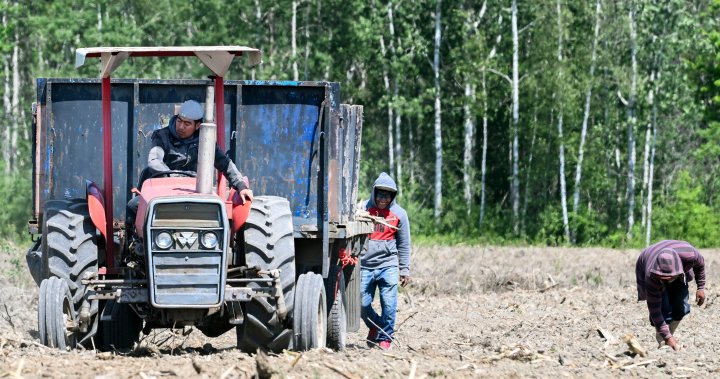Canada’s new initiative to attract skilled workers to the agricultural sector is being panned by some as exclusionary and overlooking workers who already toil in Canada’s fields and factories.
On Wednesday, the federal government announced changes that will see it issue invitations through the Express Entry program to people with experience in agriculture to apply for permanent residency.
The move comes as Canada braces for a looming wave of retirements and worker shortages in the farming and agricultural industries.
But some are raising concern the changes will breed discrimination in the system over what counts as high-skilled and low-skilled work in the sector.
“The Express Entry program expressly prohibits applications from workers deemed low-skilled. And that’s the majority of migrants all over this country,” Syed Hussan, executive director of Migrant Workers Alliance for Change (MWAC), said.
The latest round of category-based selections for newcomers is aimed at people who worked as agricultural service contractors, farm supervisors, and retail and wholesale butchers, among other agri-business jobs.
This is part of the category-based selection system, which was introduced in May this year and aims to bring newcomers with experience in specific industries facing labour shortages, including transportation, construction, trades and health care.
“Food security is top of mind for all Canadians, and our country is the fifth-largest exporter of agri-food and seafood on the planet. That is why addressing labour shortages is crucial to maintain the sector’s ability to produce and process food at this scale for Canadians and export markets around the world,” Immigration Minister Marc Miller said.
Lawrence MacAulay, Canada’s agriculture minister, said, “Canada’s Express Entry system is an important tool that attracts workers with the skills our world-class agricultural sector needs.”

Hussan, however, is concerned that the qualifications are unclear.
“Once you stick that label of ‘low-skilled’ on a human being, you can pay them less. You can exploit them, or you can deny them rights,” Hussan said. “And so the act of determining what work is considered high- or low-skilled has enormous economic impact on the bottom line of billionaires.”
According to Statistics Canada, a total of 70,365 temporary foreign workers came to Canada in 2022.
In the same year, the agriculture sector’s contribution to Canada’s GDP was around $144 billion and exports amounted to nearly $93 billion.
Tomoya Obokata, the UN special rapporteur on contemporary forms of slavery, has raised concerns.
“I am deeply disturbed by the accounts of exploitation and abuse shared with me by migrant workers,” he said.
“Employer-specific work permit regimes, including certain Temporary Foreign Worker Programmes, make migrant workers vulnerable to contemporary forms of slavery, as they cannot report abuses without fear of deportation.”
Obokata said Canadian companies should be forced to implement mandatory human rights due diligence.
According to Hussan, this reflects an unwillingness to change on the part of the Canadian government.
“I think that there is a clear acknowledgment that the agriculture industry, like many industries, needs people in it. But (there is) an unwillingness to let go of this long-term discriminatory view that people who work with their hands are not worthy of rights.”
In the last few months, the federal government has rolled out a slew of measures to attract “high-skilled” talent across different fields. In August this year, Miller announced the first round of invitations to newcomers who work in the trades, to deal with the shortage of construction workers in the country.
In June, then-immigration minister Sean Fraser said Canada was aiming to double the number of health-care professionals it welcomes each year. Fraser also announced a suite of new visas aimed at getting the best talent in STEM (science, technology, engineering and mathematics) fields. This included new provisions, such as visas for “digital nomads” who can live and work in Canada while working remotely for a foreign employer.
© 2023 Global News, a division of Corus Entertainment Inc.



